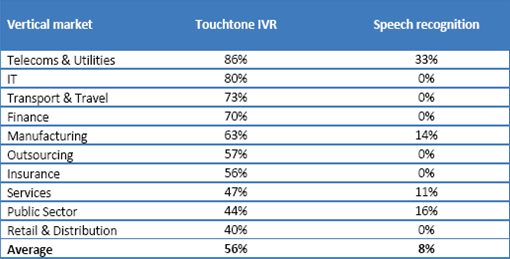
Despite a common dislike of touchtone technology, new research published by ContactBabel has found that IVR usage is still widespread in large call centres. Touchtone technology is used to greet callers in 56% of contact centres.
In 2009 the number of call centres using IVR or speech recognition has shown a small decline to 64% (56% Touchtone IVR and 8% speech recognition), having peaked at 67% in 2007. In contrast the 2004 figure was 46% Touchtone IVR and 8% speech recognition.
IVR usage is highest in telecoms and utilities and lowest in retail and distribution.

The report also highlights that in voice self service a mean average of 17% of calls that go into the self-service option are “zeroed-out”, i.e. where the customer decides that they in fact wish to speak with an operator.
The report’s author, Steve Morrell, commented:
“The use of touchtone IVR has probably peaked: it’s a mature technology, and although it does a competent job in many cases, it is inflexible and unpopular with customers. Industries such as telecoms and utilities have been using IVR for many years, especially in cases where a large proportion of calls are repetitive (such as meter readings) or where call volumes are very high and reducing misdirected calls really cuts cost. However, for sales-driven industries like retail, many businesses have chosen to deal live with the customer as soon as they can, and in the public sector – a high-growth area of the contact centre industry – the need to improve customer satisfaction is paramount. However, we would expect speech recognition to continue its substitution of touchtone IVR, although the cut in many businesses’ capital expenditure has put speech projects on hold.”
The “UK Contact Centre Decision-Makers’ Guide (2009 – 7th edition)” replaces the “UK Contact Centre Operational Review” as the major annual report studying the performance, operations, technology and HR aspects of UK contact centre operations.
Taking a random sample of the industry, a detailed structured questionnaire was asked to 210 contact centre managers and directors between April and July 2009. Analysis of the results was carried out July to August 2009. The result is the 7th edition of the largest and most comprehensive study of all aspects of the UK contact centre industry.
A free copy of the Executive Summary is available from the ContactBabel website (www.contactbabel.com).
Author: Jo Robinson
Published On: 21st Oct 2009 - Last modified: 11th Sep 2019
Read more about - Archived Content

2 Comments
-
Interesting stats from Contact Babel and put into an interesting context in the first paragraph to get us thinking.
It really is worth asking your customers what they actually think of your IVR so you have some credible information to feed into your thought processes and not just anecdotal information.
By doing this your customers may help you to identify improvements which can be made to make your IVR applications more user friendly and, they may even surprise you completely by telling you that they actually like to use it! ICR ran an automated survey for one of its banking clients recently which asked customers what they thought of the banks automated applications and the results were overwhelmingly positive.
A couple of scenarios:
1. If you were to ask a customer the question “would you prefer to speak to a person or use an automated system” then you are likely to get a negative response for the IVR. However, as most call centre managers are well aware, it isn’t possible to staff up to the level required for every caller to be greeted and handled from start to finish by a human being because it’s just too expensive. Not only that, but if you followed up on customers responses to this question and removed your call routing applications you would create more person to person hand-offs which are annoying for the customer and take up costly agent time.
2. In a scenario which includes a transactional application we could again ask the caller if they would prefer to use the automated system to complete their task or speak to a person, and again the response would most likely be negative for the IVR. But we lets ask them a more appropriate question “would you prefer to use an automated system immediately to complete your task or be put on hold for a long period of time until someone is available to handle your request” – the answer may well be quite different…
In addition, customers may form a negative opinion of the automated system because they are not aware of the different technologies utilised in a contact centre. They may believe the IVR and being put on hold is provided by the same automated system – effectively blaming the IVR for being put on hold when the actual reason is that there aren’t enough people available to handle their call.
Hope that’s of interest to some people.
Darren Mills
22 Oct at 15:01
-
I don’t think the results are particularly surprising. Similar surveys have shown the same thing for some but the Contact Babel report goes into more detail. Another survey showed that given the option of an offshore agent or an IVR, over 90% plumped for the offshore agent. Despite this, there have been a number of high profile cases of companies bringing work back from offshore locations but you never hear of anyone scrapping or limiting their IVR or automation. I don’t think that all people are against IVR per se. They are opposed to what I term “forced automation”. There are lots of cases where you need to speak with a live agent but it just seems too complex to get through. Companies need to ensure that more basic transactions are automated but that there is always the option to speak with an agent. I recently met one forward thinking executive who told me that their plan is to limit the IVR and ensure they keep their service levels by overflowing their peak call traffic to an outsourced provider. If only all executives understood the problems of forced automation, I feel they would do the same.
Rob OMalley
22 Oct at 16:44
Get the latest call centre and BPO reports, specialist whitepapers and interesting case-studies.









Interesting stats from Contact Babel and put into an interesting context in the first paragraph to get us thinking.
It really is worth asking your customers what they actually think of your IVR so you have some credible information to feed into your thought processes and not just anecdotal information.
By doing this your customers may help you to identify improvements which can be made to make your IVR applications more user friendly and, they may even surprise you completely by telling you that they actually like to use it! ICR ran an automated survey for one of its banking clients recently which asked customers what they thought of the banks automated applications and the results were overwhelmingly positive.
A couple of scenarios:
1. If you were to ask a customer the question “would you prefer to speak to a person or use an automated system” then you are likely to get a negative response for the IVR. However, as most call centre managers are well aware, it isn’t possible to staff up to the level required for every caller to be greeted and handled from start to finish by a human being because it’s just too expensive. Not only that, but if you followed up on customers responses to this question and removed your call routing applications you would create more person to person hand-offs which are annoying for the customer and take up costly agent time.
2. In a scenario which includes a transactional application we could again ask the caller if they would prefer to use the automated system to complete their task or speak to a person, and again the response would most likely be negative for the IVR. But we lets ask them a more appropriate question “would you prefer to use an automated system immediately to complete your task or be put on hold for a long period of time until someone is available to handle your request” – the answer may well be quite different…
In addition, customers may form a negative opinion of the automated system because they are not aware of the different technologies utilised in a contact centre. They may believe the IVR and being put on hold is provided by the same automated system – effectively blaming the IVR for being put on hold when the actual reason is that there aren’t enough people available to handle their call.
Hope that’s of interest to some people.
I don’t think the results are particularly surprising. Similar surveys have shown the same thing for some but the Contact Babel report goes into more detail. Another survey showed that given the option of an offshore agent or an IVR, over 90% plumped for the offshore agent. Despite this, there have been a number of high profile cases of companies bringing work back from offshore locations but you never hear of anyone scrapping or limiting their IVR or automation. I don’t think that all people are against IVR per se. They are opposed to what I term “forced automation”. There are lots of cases where you need to speak with a live agent but it just seems too complex to get through. Companies need to ensure that more basic transactions are automated but that there is always the option to speak with an agent. I recently met one forward thinking executive who told me that their plan is to limit the IVR and ensure they keep their service levels by overflowing their peak call traffic to an outsourced provider. If only all executives understood the problems of forced automation, I feel they would do the same.